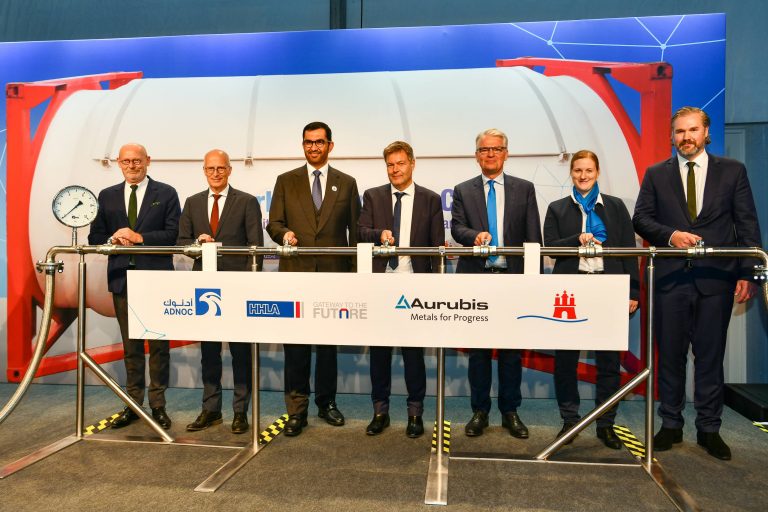- First delivery of blue, low-carbon ammonia has arrived at Aurubis from the United Arab Emirates
- Use of ammonia reduces amount of natural gas required for the production of copper wire rod by up to 20 %
- CEO Roland Harings: “An additional important step towards the decarbonization of our industrial processes by means of hydrogen derivatives.”
Aurubis is taking an additional step toward climate neutrality by testing the industrial use of blue ammonia as a fuel. Dr. Robert Habeck, German Federal Minister for Economic Affairs and Climate Action, and His Excellency Dr. Sultan Ahmed Al Jaber, UAE Climate Envoy and Minister for Industry and Advanced Technology, together with Hamburg’s First Mayor Dr. Peter Tschentscher, HHLA Executive Board Member Torben Seebold and Aurubis CEO Roland Harings put the pilot project into operation at the Hamburg site.
“We want our production to be climate-neutral well before 2050. Ammonia can be an important component of the hydrogen supply chain to achieve this goal,” declared Aurubis CEO Roland Harings. The multimetal company already operates the most efficient and sustainable smelter network in the world. “This pilot project highlights the pioneering role we play in the decarbonization of our industry. It demonstrates that the creation of a blue – and in the future, green – ammonia value chain between Germany and the United Arab Emirates is not just theoretically possible, but practically feasible.”
The Abu Dhabi National Oil Company (ADNOC) shipped the 13 tons of ammonia required for the test series from the United Arab Emirates, which were transshipped at Terminal Altenwerder by Hamburger Hafen und Logistik AG (HHLA). The delivery was a result of the hydrogen collaboration between the United Arab Emirates and Germany, which was intensified at the beginning of the year. Aurubis and ADNOC concluded the supply contract during the trip that Dr. Habeck took to Abu Dhabi.
Important Signal for Germany as an Industrial Location
During the eight-week test series, low-emission ammonia will partially replace fossil natural gas in the rod plant. If the pilot project is successful, up to 4,000 tons of CO2 per year could be saved in the Aurubis plant in Hamburg alone.


